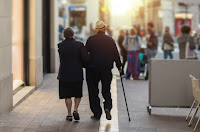Put simply, I cannot get my mother out of me. Why was Mom frequently correct? Typical North American psychologists and social workers agree that individuation and separation constitute important developmental stage. Baby Boomers and Generation X strive to differentiate from their parents. The trajectory for Millenials and younger groups confounds me, (though probably similar).
My parents were immigrants, double the trouble. First generation offspring automatically discard foreign superstitions and generational differences into the dumpster of ridiculous nonsense. My mother disparaged the use of plastic bags for storing foods which I ignored--turns out she had a point. Mother refused to do take-out meals, especially drinks in the car, an enduring habit of mine. Yes, sitting down with a non-disposable cup and saucer in a cafe or at home facilitates relaxation and mindfulness. My generation and the succeeding one enriched their young children with a myriad of activities. Certainly, such practice exposes the kids to a wider world. But independent play, as my parents' generation encouraged, without adult intervention, enables self-reliance. No argument there. My mother recycled before it was a sound environmental policy. I need not continue, since the examples stretch on into infinity. If you include grandparents; fresh air, home cooked meals, walking, not too much T.V., and Saturday opera from the Met on the radio add to the list of worthwhile suggestions which I have embraced.
My parents maintained contacts with people around the world. The names and vital information were printed legibly in little leather address books, found in my parents' and grandmothers' possessions after their deaths. From A-Z, in their proper sections, one discovered--B for Bloch in London, or S for Stern in Johannesburg. My grandparents used the addresses for a back-up plan in their escape from the Nazis.
By the time I grew up, my elders, still in possession of the well-used address books, asked me to ring "so-and-so" when I was in New York, for example. I dreaded those cold calls, feeling extremely awkward, insecure, and annoyed to bother strangers who may or may not be interested in me.
In 2017, my sister and I accompanied my mother to Santa Fe, or rather she took us. Our mom removed a dog-eared postcard with an artist's name and number from her travel bag.
She announced, "I'd like to contact this artist."
My sister and I groaned. The situation triggered my trauma of phoning strangers."This card is an advertisement. Why would you think the artist would see you personally?" I said too emphatically, since I dreaded the eventual phone call. My sister drove and I, relegated to the backseat, made the call. After several attempts--"Mom she's unavailable!" I yelled, while making faces that my sister could see in the rearview mirror.
"Try again, just one more time," she pleaded.
So I did. We connected with the artist who directed us cheerfully to her home studio the following afternoon. My sister drove to a lovely residential area of Santa Fe with cactus lined streets. We arrived at our destination, and I said, "ok, Mom, here we are."
"Oh great, let's go." She replied.
We sisters refused to leave the car, believing this to be silly endeavor. Our mother left the car and walked up the driveway to be greeted by the artist. After five minutes or so, the two returned and beckoned us to the studio. We agreed reluctantly. Exploring an actual artist's studio, with a view of a beautiful backyard, peaked my interest. Another few minutes passed, and we realized this was not a wasted field trip to a boring place.
That is the day we met Sandra Duran Wilson, a talented, innovative artist and teacher, certainly "the real deal." Prolific, she creates pieces of art in multi media. First and foremost, she is gracious, empathic, and down-to-earth, not at all like other artists I met that day in the artsy section of the town.
My mother had found Sandra in an art show on her first trip to New Mexico, which explained the wrinkled post card. The day we visited, mother, at the age of nearly 90, bought the second of two of the artist's works. I purchased two of Duran-Wilson's paintings on the Internet last week. Ms. Duran-Wilson originates from the vivid surroundings of the American Southwest that inspired such artists as Georgia O'Keefe and writer Willa Cather.
So our intensely curious, intelligent, and old-fashioned mother was right again!
(Sisters flanking mother, in case you think we are all sisters!)
© 2021Karen Levi








